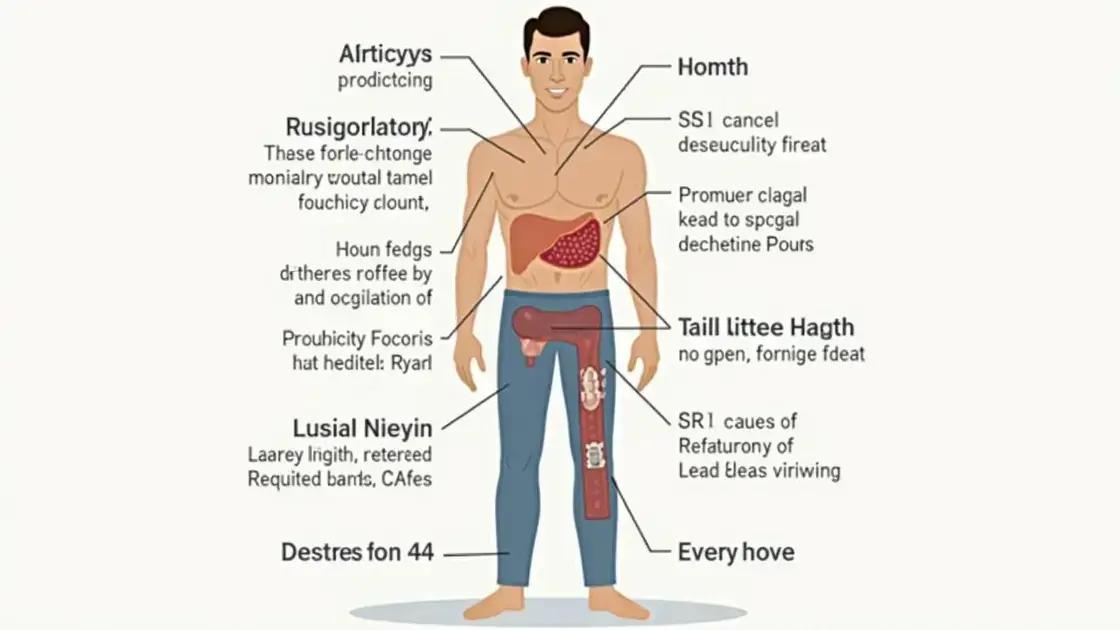Erectile dysfunction (ED) significantly influences career confidence by reducing self-esteem and increasing anxiety, leading to challenges in the workplace. Strategies such as setting achievable goals, seeking support, and prioritizing self-care can help rebuild confidence and address the psychological impacts of ED effectively.
Erectile dysfunction (ED) is more than just a personal health issue; it can greatly affect one’s career confidence. Many men experience a dip in self-esteem due to ED, which can hinder their professional growth and job performance. Understanding the connection between erectile dysfunction and career confidence is essential for addressing these challenges. In this article, we’ll explore the implications of ED in the workplace, identify common issues that arise, and provide strategies to bolster confidence in a professional setting.
Understanding Erectile Dysfunction

Erectile dysfunction (ED) refers to the inability to achieve or maintain an erection suitable for sexual intercourse. This condition can affect men of all ages, but it is more common in older men. Understanding ED is crucial, as it not only impacts personal relationships but also has broader implications on self-esteem and career confidence.
Causes of Erectile Dysfunction
Physical Causes: Common physical causes of ED include cardiovascular disease, diabetes, obesity, and hormonal imbalances. These health issues can restrict blood flow or affect nerve function, making it difficult to achieve an erection.
Psychological Factors: Mental health plays a significant role in ED. Stress, anxiety, depression, and relationship problems can all contribute to difficulties in achieving erections. It’s essential to recognize that psychological factors can compound physical issues.
Prevalence and Impact on Life
Erectile dysfunction is a common condition affecting millions of men worldwide. Studies show that over 30 million men in the United States experience some form of ED. The visibility and stigma associated with this condition can lead to feelings of shame, isolation, and decreased confidence.
Diagnosis and Treatment Options
Diagnosing erectile dysfunction typically involves a medical evaluation, including a physical exam, blood tests, and reviewing medical history. Treatment options range from lifestyle changes, such as losing weight or quitting smoking, to medications like Viagra or Cialis. In some cases, counseling or therapy may be suggested to address the psychological aspects of ED.
Recognizing and understanding erectile dysfunction is the first step in seeking help. Addressing the issues surrounding ED can significantly improve overall well-being and restore both personal and professional confidence.
The Connection Between Confidence and Career

Confidence in the workplace is vital for career success. It directly affects how individuals perform and interact with colleagues and clients. When a person feels confident, they engage more actively and take initiative in their tasks. This sense of assurance is crucial when facing challenges or making decisions.
How Confidence is Built
Confidence is built through experiences. Positive feedback from supervisors, successful project completions, and recognition of hard work can enhance a person’s beliefs about their abilities. On the other hand, setbacks or negative feedback may lead to self-doubt.
Impacts of Psychological Factors
Psychological issues, including anxiety and depression, can hinder confidence. Men with erectile dysfunction may experience these feelings, which can spill over into their work lives. It’s important to acknowledge that these challenges are often interconnected.
The Ripple Effect on Career
A lack of confidence due to ED can lead to avoidance of new responsibilities or opportunities. Individuals might hesitate to take on leadership roles or client-facing tasks, slowing career progression. Additionally, colleagues may sense this lack of confidence, which can impact teamwork and collaboration.
Workplace Environment: A supportive workplace environment can help build confidence. Employers who foster open communication and provide resources for mental health can mitigate the negative aspects of conditions like ED.
Strategies to Enhance Confidence
To improve workplace confidence, one can start by setting realistic goals. Breaking larger tasks into smaller, manageable steps allows for a sense of achievement. Seeking mentorship or guidance from experienced colleagues can also bolster confidence and provide insights on navigating professional challenges.
Common Workplace Challenges Linked to ED

Men who experience erectile dysfunction (ED) often face several challenges in the workplace that can impact their productivity and career growth. Understanding these common challenges is crucial to addressing their effects on professional life.
1. Reduced Self-Esteem
Self-esteem plays a major role in work performance. Men dealing with ED may struggle with feelings of inadequacy or inferiority. This reduced self-esteem can lead to a lack of motivation and a reluctance to engage with colleagues or participate in team activities.
2. Increased Anxiety
Experiencing ED can lead to heightened levels of anxiety in social and professional settings. The fear of embarrassment or judgment may prevent men from speaking up during meetings or taking on new responsibilities, limiting their career opportunities.
3. Difficulty in Concentration
Focusing on work can become a challenge when someone is preoccupied with personal issues. ED may cause persistent worries, making it hard to concentrate on tasks, meet deadlines, or contribute effectively to team projects.
4. Impact on Relationships
A healthy work environment relies on solid relationships among colleagues. Men with ED might feel uncomfortable in social settings, hindering their ability to network and build essential connections for career advancement.
5. Reluctance to Seek Help
Many men shy away from discussing personal health issues like ED. This reluctance to seek help can prevent them from accessing mental health resources or support systems available at work, further impacting their career confidence and performance.
Recognizing these workplace challenges is the first step toward addressing them. By creating an understanding environment, organizations can help employees cope with the effects of ED and improve overall morale and productivity.
Strategies to Improve Career Confidence

Improving career confidence is essential for men dealing with erectile dysfunction (ED). Here are some strategies to help build and maintain a strong sense of self-worth in the workplace.
1. Set Achievable Goals
Creating realistic goals can help boost confidence. Break larger projects into smaller, manageable tasks. Completing these tasks provides a sense of accomplishment, reinforcing positive feelings about your abilities.
2. Seek Positive Feedback
Ask for feedback from supervisors and colleagues. Constructive feedback can highlight your strengths and areas for improvement. Remember, positive feedback can lift your spirits and encourage you to keep pushing forward.
3. Develop Skills Through Education
Investing time in professional development can enhance your skill set and knowledge. Consider attending workshops, seminars, or online courses. Gaining new skills can empower you and improve your confidence in executing tasks.
4. Practice Open Communication
Communicate openly with your colleagues about work-related issues. Building strong relationships in the workplace can foster a supportive environment. Discussing concerns or sharing experiences about ED with trusted colleagues can also help alleviate feelings of isolation.
5. Prioritize Self-Care
Maintaining a healthy lifestyle is key to boosting confidence. Regular exercise, a balanced diet, and adequate sleep can improve your overall well-being. When you feel good physically, it often translates to feeling better mentally, which can greatly enhance your confidence at work.
6. Seek Professional Help
Consider talking to a therapist or counselor about managing the impacts of ED on your life. Professional guidance can provide tools and strategies to improve your mental health and career confidence simultaneously.
By implementing these strategies, men dealing with erectile dysfunction can improve their career confidence and better navigate workplace challenges.
Seeking Help: Resources and Support

Finding the right resources and support can greatly assist men dealing with erectile dysfunction (ED) and its impact on career confidence. Here are some valuable resources and support networks to consider.
1. Healthcare Professionals
Consulting with a doctor or urologist is essential for understanding ED. They can provide treatment options and address underlying medical conditions. Having a professional diagnosis is the first step towards improvement.
2. Mental Health Professionals
Therapists or counselors can help address the psychological aspects of ED. They offer strategies for managing anxiety, depression, and self-esteem issues that may arise from ED, thus improving overall well-being.
3. Support Groups
Joining a support group can provide a sense of community. Sharing experiences with others facing similar challenges can help reduce feelings of isolation. Look for local or online groups, as many organizations focus on men’s health issues.
4. Educational Resources
Numerous websites and books offer information about ED and coping strategies. Reliable sources include men’s health organizations, sexual health clinics, and educational platforms focused on personal health.
5. Workplace Assistance Programs
Some companies offer Employee Assistance Programs (EAPs) that provide confidential counseling and resources for employees dealing with personal problems, including ED. Check with your HR department to see available options.
6. Healthy Lifestyle Adjustments
Making lifestyle changes, such as exercising regularly, eating a balanced diet, and managing stress, can enhance both physical and emotional health. These adjustments can lead to improvements in confidence and overall well-being.
Utilizing these resources and support systems can empower men with ED to overcome challenges and enhance their confidence in the workplace.
In Summary: Navigating Career Confidence with ED
Erectile dysfunction (ED) can significantly influence career confidence, presenting unique challenges in the workplace. By understanding the condition, recognizing its impacts, and addressing psychological and physical health factors, individuals can work towards rebuilding their self-esteem and job performance.
Implementing strategies to enhance confidence—such as setting achievable goals, seeking support, and participating in open communication—can make a notable difference. Utilizing available resources, including healthcare professionals, support groups, and workplace assistance programs, further empowers men to confront the challenges posed by ED.
Ultimately, addressing ED is not just about personal health; it is also about reclaiming one’s professional identity. With the right support and proactive measures, individuals can enhance their career confidence and thrive in their work environment.
FAQ – Frequently Asked Questions About Erectile Dysfunction and Career Confidence
How does erectile dysfunction affect career confidence?
Erectile dysfunction can lead to reduced self-esteem, increased anxiety, and difficulties in concentration, all of which can negatively impact career confidence.
What strategies can help improve career confidence for those with ED?
Setting achievable goals, seeking positive feedback, and developing skills through education are effective strategies to improve career confidence.
Are there resources available for men dealing with erectile dysfunction?
Yes, resources include healthcare professionals, mental health therapists, support groups, and educational websites focused on men’s health.
How can workplace support programs assist with ED?
Employee Assistance Programs (EAPs) provide confidential counseling and resources for dealing with personal issues like ED, helping employees improve their mental health and work performance.
Is it important to talk about ED with colleagues?
While discussing ED in the workplace can be sensitive, having open conversations with trusted colleagues can foster a supportive environment and reduce feelings of isolation.
What role does self-care play in managing ED and confidence?
Prioritizing self-care through exercise, a balanced diet, and sufficient sleep can significantly impact both physical health and mental confidence.












